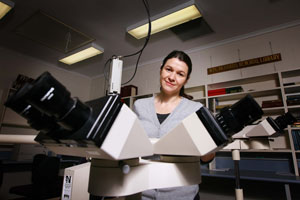Poultry CRC researcher and veterinarian, The University of Melbourne’s Dr Joanne Devlin, is one of six young Victorian scientists to win a prestigious 2009 Victoria Fellowship.
The Victoria Fellowships, each worth $18,000, were first awarded by the Victorian Government in 1998 to recognise young researchers with leadership potential and to enhance their future careers, while developing new ideas which could offer commercial benefit to Victoria.
To date, much of Joanne’s work has focused on infectious laryngotracheitis virus (ILTV), a contagious respiratory disease in poultry. She has identified a viral protein (glycoprotein G) that is critical for this herpesvirus to cause disease.
Joanne will use her fellowship to work at the Institute for Animal Health in the United Kingdom to learn more about how glycoprotein G interacts with the immune system of birds. She hopes that the fellowship will help achieve a better understanding of how herpesviruses cause disease in their hosts. This knowledge will be used to develop a new generation of vaccines to control disease in a wide range of animal species, including animals in our economically important poultry and equine industries.
The Victoria Fellowship will also help Joanne build on her suite of research, which has resulted in a new vaccine to control disease caused by ILTV in poultry. Her research findings have been published in leading international science journals.
Joanne graduated with a Bachelor of Veterinary Science (Honours) from the University of Sydney in 2001 and worked in private veterinary practice in Victoria before completing a PhD in microbiology at The University of Melbourne. As well as lecturing, she is an Australian Research Council post-doctoral research fellow and is involved in two CRC short term projects investigating ILTV vaccine candidates. One project seeks to further characterise an existing glycoprotein G deficient vaccine candidate, which has already demonstrated safety and efficacy and which promises to enable serological differentiation between infected and vaccinated birds. The other project aims to modify the glycoprotein G deficient candidate by creating a recombinant version expressing the S protein of infectious bronchitis virus (IBV) and thereby providing a level of protection against IBV.


